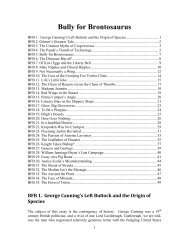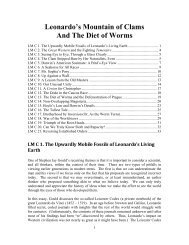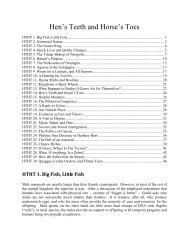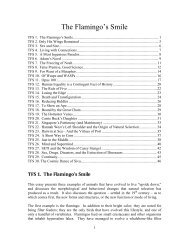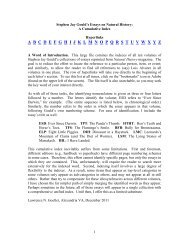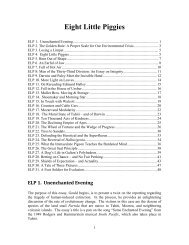What might a better definition of the term “individual” involve, biologically speaking?This question brings Gould to the real point of this essay. <strong>In</strong> Darwin’s view, anindividual is the structure that is the focal point for the forces of natural selection. Thereare five required criteria in this view: the individual have a definite temporal start andstop points (birth and death); it must remain genetically stable for the time in between; itmust be able to reproduce; and these offspring “must be produced by a principle ofinheritance that makes children resemble parents, with the possibility of somedifferences.” <strong>In</strong>terestingly, bamboo colonies, groups of aphids, and fungal mats alsomeet these criteria, and in this sense may be identified as individuals. Furthermore, genesthemselves may exhibit such behavior [HTHT 13], and (he argues) species can as well.[Gould does not elaborate on this here, but it is an essential theme of his professionalpapers, and of his final work The Structure of Evolutionary Theory. This view onlyworks under the paradigm of punctuated equilibrium. <strong>In</strong> this view, a species comes intoexistence relatively abruptly (in a punctuation), and later becomes extinct. Importantly,during the extended period between these events, the organism is in stasis, as opposed tothe modern synthesis view of gradual but continuous phyletic change. <strong>In</strong> the punctuatedequilibrium (PE) paradigm, “speciation” is analogous to reproduction, and the“offspring” are both similar to, and different from, the ancestral stock.] Thus, in thisview, genes and species may both be considered “evolutionary individuals” andsusceptible to Darwinian-like selection processes. Gould writes:Natural selection can work simultaneously at several levels of a genealogicalhierarchy – on genes and cell lineages “below” organisms, and on populations andspecies “above” organisms. All these levels produce legitimate Darwinianindividuals – and this hierarchical definition gives us the large, inclusive, andproper biological meaning of the term individual.<strong>In</strong> his own view, Gould is not replacing Darwinism and natural selection in the PEparadigm; he is extending it to include a hierarchy of levels, and broadening thedefinition of an evolutionary “individual.”DIH 27. Speaking of Snails and ScalesGould never uses the word “emergence” in this essay, but it is the underlying theme. Ashe discusses in TFS 25, emergence or holism is the view that new rules or laws come intoplay as one examines a composite structure, such as an organism or a population, asopposed to simply extrapolating the rules that apply to the components. The latter view,reductionism, allows for some very powerful simplifications if it can be appliedsuccessfully – as it can in many cases in mathematics, physics, and elsewhere. <strong>In</strong> thisessay, he discusses two examples where the reductionist view proves inadequate.He begins with his favorite “bumper sticker” definition of Homo sapiens: we arestorytellers. This description captures several attributes of our uniqueness in one phrase:we have language, we are social, and we make mental models of the world around us in acharacteristic way. Our nature leads us to view natural history, as well as human history,in terms of linear “stories” with a beginning, a middle, and an end. This helps us make34
sense of an overwhelmingly complex world. However, we can fall into the trap ofoversimplifying in this way. This is partially due to the rather limited number ofstorylines in the human repertoire, which can force us to shoehorn reality into one of afinite number of established channels. (He refers us to his concept of “literary bias,”introduced in BFB 16.) Gould acknowledges that it is in our nature to do explain theworld in terms of stories, and we never will – nor should – stop trying to do so.However, he offers, it pays to be aware of the common storylines we draw on, as thishelps us to identify our biases, or preferred modes of thought. (It also helps to increaseour repertoire of stories.) One common storyline in Western culture for the past fewcenturies is that of progress, involving changes from small to large, simple to complex,and primitive to advanced; the word “evolve” itself implies this [ESD 3, IHL 18]. (Gouldhas discussed in several of these essays how this storyline has been misapplied toevolution, with Homo sapiens as the end of the story.) Here, he presents two examplesthat illustrate his point that a simple system or structure is not always a primitive versionof a more complex one. Both involve the Caribbean island of Curacao; the first involvesthe local Creole language, and the second the land snails that Gould did his early researchon.The majority of the island’s inhabitants are mostly the descendents of African slaves.When these ancestors arrived, they spoke a plethora of languages that were mutuallyunintelligible. As has been well-documented in similar cases, people in suchcircumstances begin to communicate with each other through a “pidgin” which is notnative to any of them. Pidgins have no grammar to speak of. However, and remarkablyrapidly – often in a single generation – the pidgin proto-language evolves into a Creole,which is a true language with a characteristic but simple grammar. This occurred onCuracao, leading to a unique Creole language called papiamentu. Most of the words areclearly related to the Dutch and Portuguese languages of the former slaveholders, but thegrammar is unlike either of them. This is where the concept of progress falsely appears:for centuries, linguists thought of Creole languages as primitive forms of our own. Thatis, scholars believed that human language “progressed” over time from meaningfulgrunts, through pidgin and Creole-like forms, into modern <strong>In</strong>do-European and otherlanguages. What more recent studies have shown is that the grammars of these Creolelanguages resemble each other far more than they resemble, say, the language of the localruling class. Gould references the famous linguist Noam Chomsky, who argues thatthese grammars reflect a universal, evolutionarily-developed human grammaticalstructure. The point, Gould tells us, is that Creole languages are not an “in-between”state reflecting partial progress toward our own language, but instead something else;something different.<strong>In</strong> the second example, Gould recounts his early professional research in the field of landsnails on the very same island of Curacao, and is quite autobiographical. The genusCerion is very diverse and widely distributed throughout the Caribbean, but only a singlespecies exists on this island. He discusses how two previous research efforts had come toopposite conclusions about the distribution of variations within this population onCuracao. One study concluded that there were distinct regional differences; the otherconcluded that all of the variations were due to the immediate local conditions (elevation,35
- Page 4 and 5: cloud (“nebula”) of gas and dus
- Page 6 and 7: goodness, and is both intelligent a
- Page 9: The second news story involves the
- Page 12 and 13: key ways. Prior to 1994, no fossil
- Page 14: DIH 11. Lucy on the Earth in Stasis
- Page 17: directly resulted in a mass extinct
- Page 20 and 21: Edgar Allan Poe, it turns out, wrot
- Page 22 and 23: things male, while the beautiful is
- Page 24 and 25: interest, until the entrepreneur of
- Page 26 and 27: essay is that scientists, for all t
- Page 28 and 29: DIH 23. The Smoking Gun of Eugenics
- Page 30 and 31: half-Jewish meant Jewish, while qua
- Page 32 and 33: Darwin’s theory, like Adam Smith
- Page 36 and 37: type of soil, amount of rain, and s
- Page 38 and 39: Case Four, in Gould’s words, is
- Page 40 and 41: multiplying his findings by the num
- Page 42 and 43: other departments, something that r
- Page 44 and 45: Linnaeus, Gould states, did not sim
- Page 46: greatly prefers these metaphors, on



